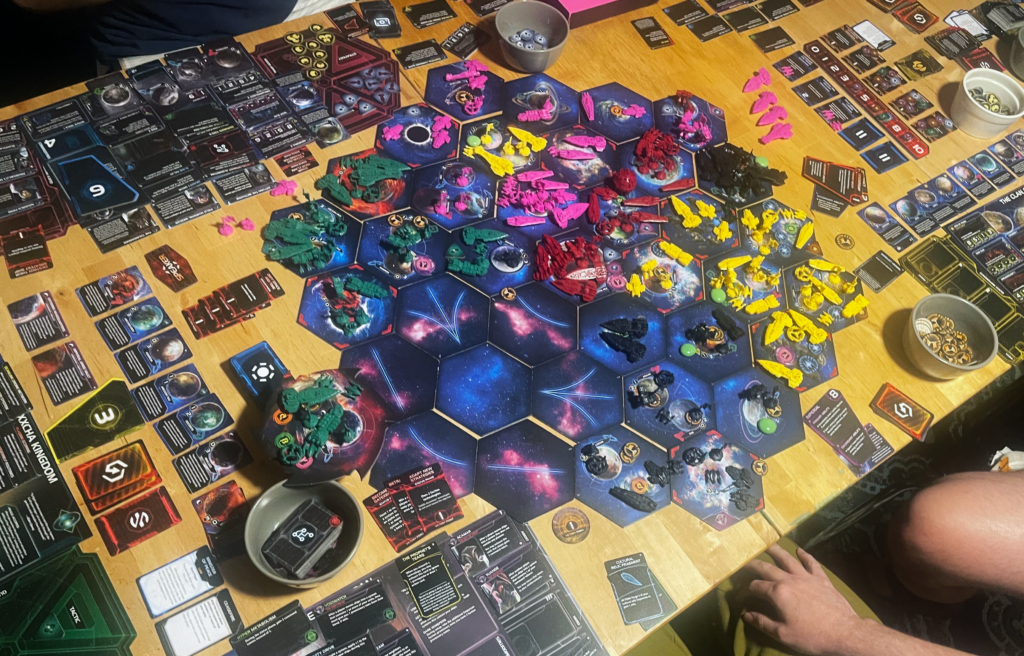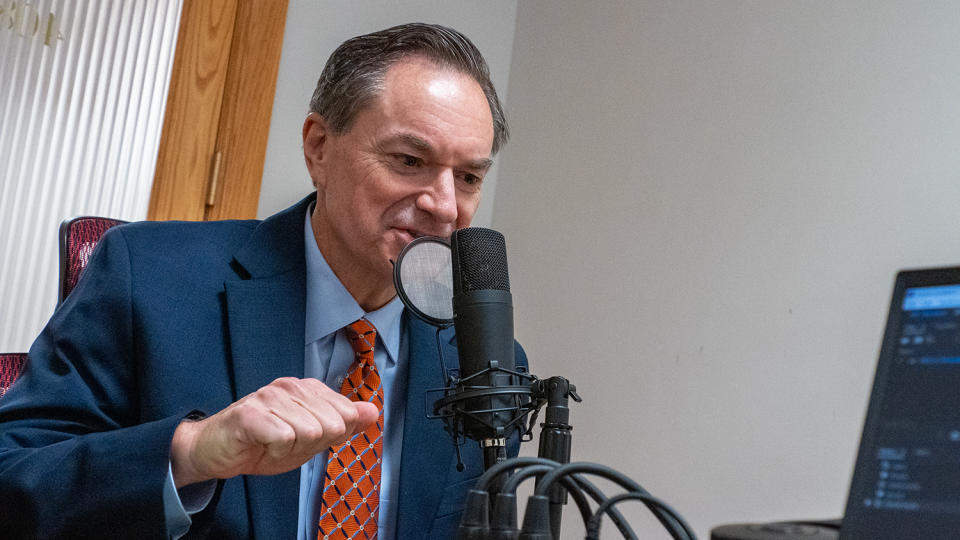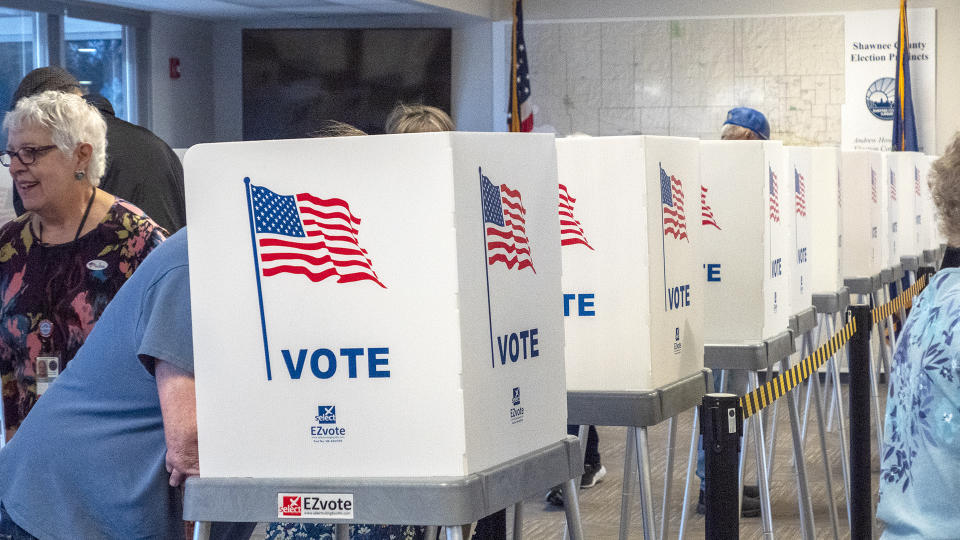Engaging with Kansas politics might be complicated. But it’s easier than this board game.

Opinion editor Clay Wirestone and his friends play a game of Twilight Imperium over the weekend. Playthroughs of the board game usually take seven or eight hours. (Clay Wirestone/Kansas Reflector)
With election season bearing down on us like an overzealous predator animal, I’d like to take a quick moment to focus on responsibility.
The chattering class, of which I’m a longtime member, likes to chatter about the responsibility of both politicians and the news media. Lawmakers and journalists should tell us the truth, but they owe us more than mere facts. They should, commenters emphasize, dedicate themselves to principles of representative democracy and civic virtue.
The ultimate responsibility, though, rests on the shoulders of a far larger group. I’m talking about voters. That’s right, the millions of men and women, young and old, Black and white and every color in between, who cast their ballots in primary and general elections. You all have a job to do as well.
A fair number of you have been falling short.
I know you all assume I’m writing about one New York real estate developer-turned-politician. He shadows a lot of these conversations. But let’s set him and his strongman act aside. Here in Kansas, voters have enabled a system that stymies exactly the policies that they tell pollsters they want.
They want an expanded Medicaid program. They want recreational marijuana — not even medical marijuana — legalized. They want schools fully funded and a sensible tax structure. Their responses remain consistent over the years, at least according to Fort Hays State University’s Kansas Speaks Poll. Yet these same voters have continued to elect supermajorities of hardcore conservative Republicans to the House and Senate who stand squarely against all of these proposals.
“People no longer think seriously about politics and take politics seriously,” Atlantic author Tom Nichols told public radio back in 2021. “They don’t participate.”
The public has chosen this course.
What’s the matter?
None of this should come as a surprise. We’ve been doing this in Kansas for decades, and a particularly well-known book lays it all out. Thomas Frank’s “What’s the Matter with Kansas?” captured hearts and minds and attention two decades ago. Yet the elections keep coming, and the choices keep being made.
Washburn University political science professor Bob Beatty pointed to Frank’s work in trying to explain why voters choose politicians who pursue policies contrary to their interests.
“A political party can be effective in making certain issues that might not affect a lot of people be prioritized over issues that these people might support and also may influence them directly,” Beatty wrote me in an email.
In other words, GOP candidates weaponize issues such as immigration, election security, crime and “critical race theory” — all non-factors in Kansas — to advance other goals.
But perhaps there’s a simpler explanation, according to the professor.
“Party identification is the greatest indicator of vote choice, still, in American elections, according to all data,” Beatty wrote. “Primaries in Kansas feature very low turnout, especially for legislative races, and the people who do turn out tend to be more conservative (sometimes much more conservative) than the general population. So, if a conservative Republican wins a primary, even if they’ve got a more moderate district overall, then party ID will kick in.”
Analysis from KFF shows that only 59% of eligible voters in Kansas actually cast ballots in the 2022 elections. That means 41% of those older than 18 who could potentially cast a ballot chose not to do so when Election Day rolled around.
Crunching data from the Kansas Secretary of State’s Office and the Census Bureau shows that a substantial number of Kansans don’t even register. Roughly 2.25 million people in the state were above the age of 18 as of July 1, 2023. Only 1.95 million had registered to vote. That works out to about 300,000 going unregistered.
You can’t have a say if you don’t raise your voice.
Our priorities
Over the weekend, several friends and I played a gigantic strategic board game called Twilight Imperium.
In the game, you play one of several alien races battling for power and influence in the galaxy. Playing requires not only understanding two books’ worth of rules, but navigating plastic spaceships across a map assembled from hexagonal tiles. As gameplay progresses, you also draw dozens of cards with potential actions and ways to score points, both publicly and secretly.
Playing a full game of Twilight Imperium can take seven to eight hours, although that’s a best-case scenario if all players know the game well and can leap into action. Our particular game took 10 hours, spread across a Saturday evening and Sunday afternoon.
Believe me, this does have to do with voting. Please bear with me.
Intensely complicated strategy board games may not be your idea of a good time. But many people become intensely involved in various hobbies. Folks of all ages play complex and absorbing video games, which transport them to other worlds while including dense screens full of statistics. A different group of enthusiasts play fantasy sports, in which building and adjusting your own team throughout a season can involve detailed research and even spreadsheets.
We don’t play Twilight Imperium or video games or fantasy football because these pursuits earn us a salary. We enjoy them. We blow off steam and spend time with friends. Yet you cannot ignore that doing so involves learning and manipulating reams of intricate data that have nothing to do with our day-to-day lives.
So why can’t we take a fraction of that absorption and critical thought and put it toward our shared civic conversation?
Why don’t voters step up to participating in their state and nation’s government with the same enthusiasm as they do toward drafting their fantasy team?
Once upon a time, perhaps when “What’s the Matter With Kansas?” came out, ignorance of the internet or 24/7 news cycle could be excused. The world had changed quickly. Yet we’ve now lived more than three decades with the web, two decades with social media and 17 years with the iPhone. If you don’t understand the technology by now, that’s on you.
Multiple resources online separate fact from fiction. Reporters and news sources across the country, including Kansas Reflector, tackle this work every day. If you want to separate legitimate news from misinformation and disinformation, you can. Not quickly, but certainly within seven to eight hours.
Each one of us has a responsibility to our state, country and shared future. Each one of us — including voters — should take that seriously.
Clay Wirestone is Kansas Reflector opinion editor. Through its opinion section, Kansas Reflector works to amplify the voices of people who are affected by public policies or excluded from public debate. Find information, including how to submit your own commentary, here.
The post Engaging with Kansas politics might be complicated. But it’s easier than this board game. appeared first on Kansas Reflector.



